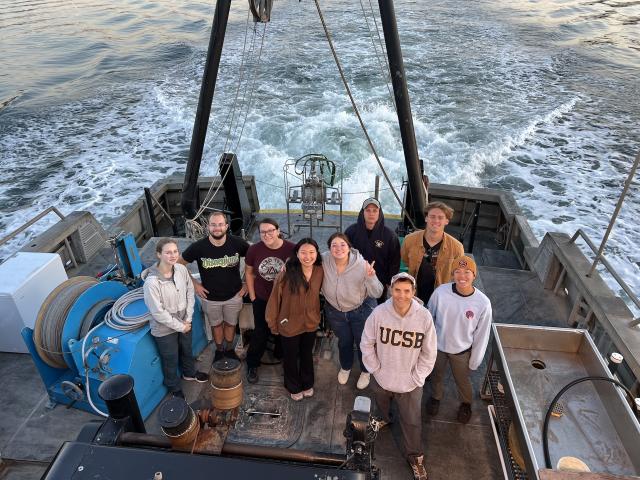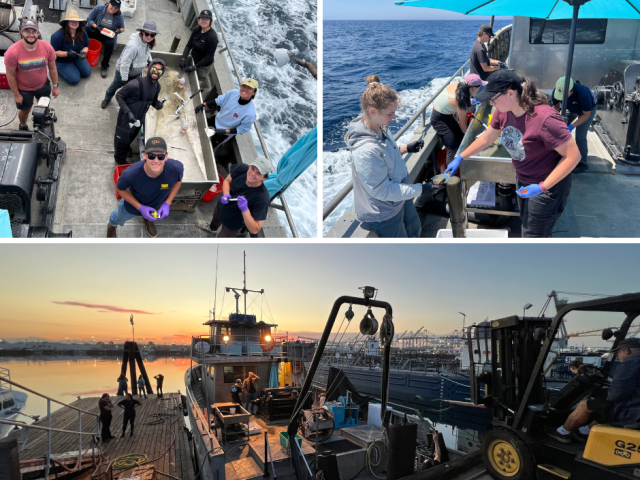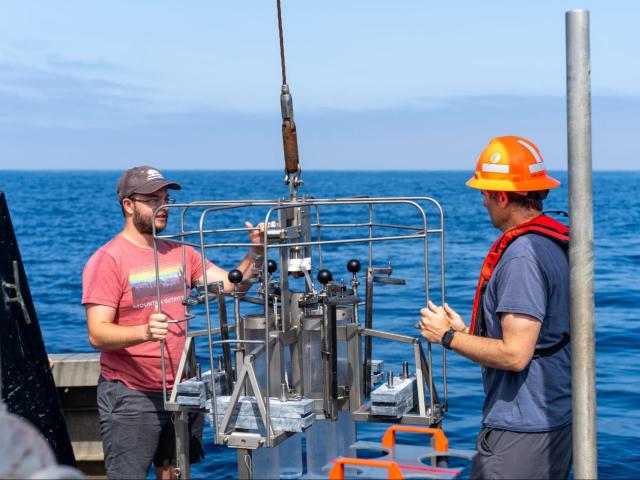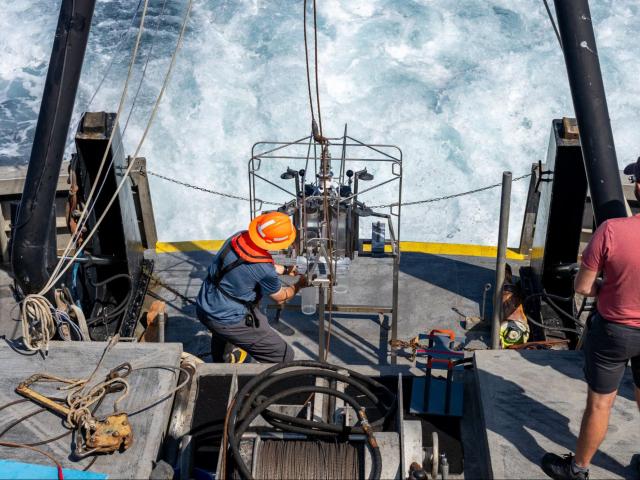Empowering the Next Generation of Marine Scientists: CCS Marine Science Faculty Dave Valentine’s Groundbreaking Research on DDT and CCS Student Involvement
CCS Marine Science students Cassidy Creighton ‘27, Casey Strattan ‘27 share insights on their involvement in DDT research

CCS Marine Science Faculty Dave Valentine has made a mark in the realm of Marine Science and more recently public policy through his groundbreaking discoveries related to the long-term effects of DDT contamination off the coast of Southern California. Now, he’s bringing this culturally impactful research to the College of Creative Studies (CCS) by engaging students in his work.
“My recent work on DDT is helping to define the scope and impacts of decades-old pollutants purposefully dumped into the waters off Southern California,” Dave explained. “My team is working on multiple aspects of this issue, from creating maps and budgets of disposal sites to understanding the transport and transformations of chemicals in the deep ocean.”

Dave, who played a key role in developing the Marine Science program as a part of his three year career plan, credits the unique structure of CCS with enabling Marine Science students to engage with complex research topics early in their academic careers. “What makes our program special compared to other marine science programs is its flexibility and focus on creativity,” he said. “We want students to explore their passions, whether it’s researching pollutants like DDT or diving into other areas of marine science.”
CCS Marine Science students have taken a hands-on role in advancing Dave’s research. Cassidy Creighton ‘27 (CCS Marine Science) has been involved by contributing to the collection and analysis of samples from DDT contaminated sites off the coast of Catalina Island. “My role in the DDT cruise was to help collect and label sediment samples from the San Pedro Basin,” Cassidy shared. “The cruise was a great learning experience, allowing me to gain firsthand insight into fieldwork and interact with PhD students who shared their research and experiences.”
Cassidy’s enthusiasm for research goes beyond sample collection. Her ongoing project in Dave’s lab examines the effects of plastic degradation on marine microbial systems—another facet of understanding human impacts on marine environments. “My research, like the DDT project, focuses on how the marine environment is harmed by human actions and how it adapts to these changes,” she noted.
Casey Strattan ‘27 (CCS Marine Science) also played an active role during a recent DDT field expedition, helping to document and analyze core samples. “One experience that stands out to me is when we saw organic material in a core sample transforming into petroleum,” Casey recalled. “It was amazing to see these complex processes that happen thousands of feet below us brought up to the surface.”

Casey has also moved on to work on another project in Dave’s lab, as part of an engineering team working to bring deep-diving robotic submersible capabilities to UCSB. To Casey, these experiences exemplify the unique opportunities CCS has provided him.
“CCS has been the most amazing opportunity of my life. I don’t believe there’s any other program that offers students, within a large, prestigious university, the freedom to build their own path,” he shared. “Without CCS, I wouldn’t have had the chance to dive so deeply into science, take some of the most fascinating classes, or be part of such an incredible community of peers who are destined to make a real impact on the world.”

For Dave, involving undergraduates in research isn’t just about mentorship—it’s about empowering students to become leaders in their fields. Many have gone on to author or co-author peer-reviewed publications, a rare achievement for undergraduates. He highlighted the contribution of former CCS student and Bren School of Environmental Science and Management Faculty Alex Phillips '15 (CCS Biology), who was key in developing the proposal for the Marine Science major itself. “Without her partnership, I don’t think we’d have the major today,” he said.
Dave’s work on DDT has the potential to guide future environmental policies and potential solutions for remediation. “Understanding the scope of DDT contamination is crucial for making informed decisions about how to mitigate its impacts,” Cassidy said. “This work shows how scientific research can directly contribute to protecting our coastal ecosystems.”
As the Marine Science program continues to expand, Dave looks forward to involving even more CCS students in projects that push the boundaries of marine research. “Our students are driven by their passion and curiosity,” he noted. “Their involvement is critical not just for their own learning but for advancing our collective understanding of complex environmental issues.”
The College applauds Dave and his students for their dedication to hands-on research and their contributions to pressing environmental challenges here on the California Coast.